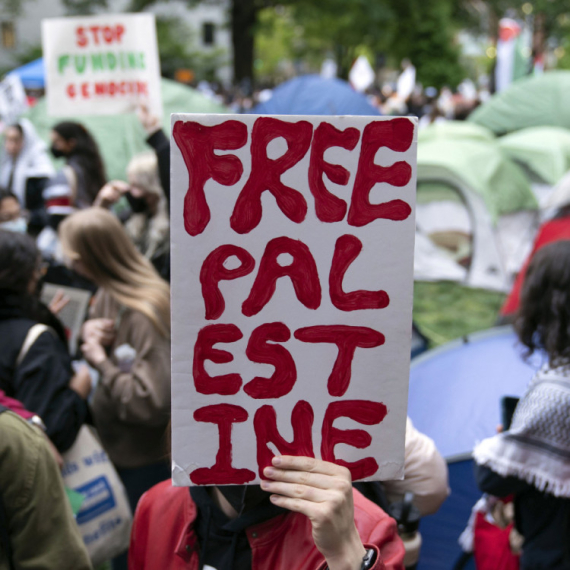EC: Serbian EULEX conditions accepted
The EU has acceded to Serbia’s demands for the deployment of the EULEX mission in Kosovo, says EC Director for the Western Balkans Pierre Mirel.
Friday, 07.11.2008.
10:28

The EU has acceded to Serbia’s demands for the deployment of the EULEX mission in Kosovo, says EC Director for the Western Balkans Pierre Mirel. The EU acknowledges that the deployment of the EULEX mission must be approved by the UN Security Council, must be status neutral, and will not have anything to do with the Ahtisaari Plan,“ Mirel told journalists after meeting with Deputy Prime Minister Bozidar Djelic. EC: Serbian EULEX conditions accepted The European Commission (EC) official added that it was important to reach a compromise allowing EULEX to be deployed throughout Kosovo and be of benefit to all the province’s citizens. Asked whether agreement had been reached with Brussels over the EULEX deployment, Djelic said that talks were under way under UN auspices and that a solution “has to be found in New York.“ The minister said that he hoped a solution acceptable to all would be found by the Security Council session on November 11. Mirel said that the EC’s report on Kosovo had found that the rule of law and the judicial system were very weak, and that EULEX’s role was to strengthen precisely these areas in order to protect all citizens, minorities in particular. Following Foreign Minister Vuk Jeremic’s statement that the EU should stop setting Serbia political conditions, Mirel said that the conditions for Serbia’s EU integration were “very clear and there are no new conditions.“ “I’d like to know what those new conditions are. I’m trying, but I’m not getting anywhere. The conditions for the Stabilization and Association Agreement (SAA) are very well-documented. There are no new conditions,“ he underlined. B92 EP resolution critical of Belgrade While the European Commission (EC) says that Serbia will not have to recognize Kosovo, the European Parliament (EP) is debating a EULEX resolution. The EP’s Foreign Policy Committee debated a draft resolution calling for EULEX to be deployed throughout the territory of Kosovo in order to “stop the partition of Kosovo.” This is the first debate on a draft resolution text that states that the Serbian government’s opposition to the EU mission is detrimental to the well-being of the Serbs in Kosovo and “is not compatible with Serbia’s aspirations for EU membership.” The draft was prepared by Dutch Green Party MEP Joost Lagendijk, who supports Kosovo independence and the implementation of the Ahtisaari plan. In the first debate, Christian Democratic MEP and German Conservative Bernd Posselt called for pressure to be put on Serbia to accept what he called the “reality of Kosovo independence,” now that 22 EU member-states had recognized the province. Under the resolution, EULEX has the key role in strengthening the rule of law, which is why EULEX is in the best interests of the Serb community in Kosovo and other minorities. Head of the EC delegation in Belgrade Josep Lloveras said earlier this week that there would be no added conditions for Serbia’s further EU integration. Foreign Minister Vuk Jeremic said that the EU had set Serbia enough conditions, and that enough was enough. He said that there had been several phases of conditioning with regards to Hague cooperation, and that after great pressure was put on Serbia’s neighbors to recognize Kosovo, Serbia was now expected to act as if nothing had happened, while it could even be heard that one other condition for receiving EU candidate status was for Serbia to recognize Kosovo independence. Jeremic added that Serbia and the EU were close to reaching an agreement on the deployment of EULEX, but stated that it had to be endorsed by the United Nations. The EU Council’s director for the Western Balkans, Stefan Lehne, denied Jeremic’s claims and said that Serbia had other obligations, but that recognizing Kosovo was not one of them. “The EU completely understands your Constitution and political sensitivity, and is not conditioning you to recognize Kosovo independence. If you look at how the member-states voted in the General Assembly, no one voted against that, and I think that this is a clear sign that we respect your position, but we want more agreement on more important issues. We expect Belgrade to cooperate with EULEX, because all 27 member-states support EULEX,” Lehne said. Meanwhile, Democratic Party of Serbia leader and former Prime Minister Vojislav Kostunica said that this was the right moment to have a vote of no confidence in the Serbian government, in a last minute bid to stop the recognition of the EULEX mission, and thus, the recognition of Kosovo independence.
EC: Serbian EULEX conditions accepted
The European Commission (EC) official added that it was important to reach a compromise allowing EULEX to be deployed throughout Kosovo and be of benefit to all the province’s citizens.Asked whether agreement had been reached with Brussels over the EULEX deployment, Đelić said that talks were under way under UN auspices and that a solution “has to be found in New York.“
The minister said that he hoped a solution acceptable to all would be found by the Security Council session on November 11.
Mirel said that the EC’s report on Kosovo had found that the rule of law and the judicial system were very weak, and that EULEX’s role was to strengthen precisely these areas in order to protect all citizens, minorities in particular.
Following Foreign Minister Vuk Jeremić’s statement that the EU should stop setting Serbia political conditions, Mirel said that the conditions for Serbia’s EU integration were “very clear and there are no new conditions.“
“I’d like to know what those new conditions are. I’m trying, but I’m not getting anywhere. The conditions for the Stabilization and Association Agreement (SAA) are very well-documented. There are no new conditions,“ he underlined.
EP resolution critical of Belgrade
While the European Commission (EC) says that Serbia will not have to recognize Kosovo, the European Parliament (EP) is debating a EULEX resolution.The EP’s Foreign Policy Committee debated a draft resolution calling for EULEX to be deployed throughout the territory of Kosovo in order to “stop the partition of Kosovo.”
This is the first debate on a draft resolution text that states that the Serbian government’s opposition to the EU mission is detrimental to the well-being of the Serbs in Kosovo and “is not compatible with Serbia’s aspirations for EU membership.”
The draft was prepared by Dutch Green Party MEP Joost Lagendijk, who supports Kosovo independence and the implementation of the Ahtisaari plan.
In the first debate, Christian Democratic MEP and German Conservative Bernd Posselt called for pressure to be put on Serbia to accept what he called the “reality of Kosovo independence,” now that 22 EU member-states had recognized the province. Under the resolution, EULEX has the key role in strengthening the rule of law, which is why EULEX is in the best interests of the Serb community in Kosovo and other minorities.
Head of the EC delegation in Belgrade Josep Lloveras said earlier this week that there would be no added conditions for Serbia’s further EU integration. Foreign Minister Vuk Jeremić said that the EU had set Serbia enough conditions, and that enough was enough.
He said that there had been several phases of conditioning with regards to Hague cooperation, and that after great pressure was put on Serbia’s neighbors to recognize Kosovo, Serbia was now expected to act as if nothing had happened, while it could even be heard that one other condition for receiving EU candidate status was for Serbia to recognize Kosovo independence.
Jeremić added that Serbia and the EU were close to reaching an agreement on the deployment of EULEX, but stated that it had to be endorsed by the United Nations. The EU Council’s director for the Western Balkans, Stefan Lehne, denied Jeremić’s claims and said that Serbia had other obligations, but that recognizing Kosovo was not one of them.
“The EU completely understands your Constitution and political sensitivity, and is not conditioning you to recognize Kosovo independence. If you look at how the member-states voted in the General Assembly, no one voted against that, and I think that this is a clear sign that we respect your position, but we want more agreement on more important issues. We expect Belgrade to cooperate with EULEX, because all 27 member-states support EULEX,” Lehne said.
Meanwhile, Democratic Party of Serbia leader and former Prime Minister Vojislav Koštunica said that this was the right moment to have a vote of no confidence in the Serbian government, in a last minute bid to stop the recognition of the EULEX mission, and thus, the recognition of Kosovo independence.























































Komentari 21
Pogledaj komentare